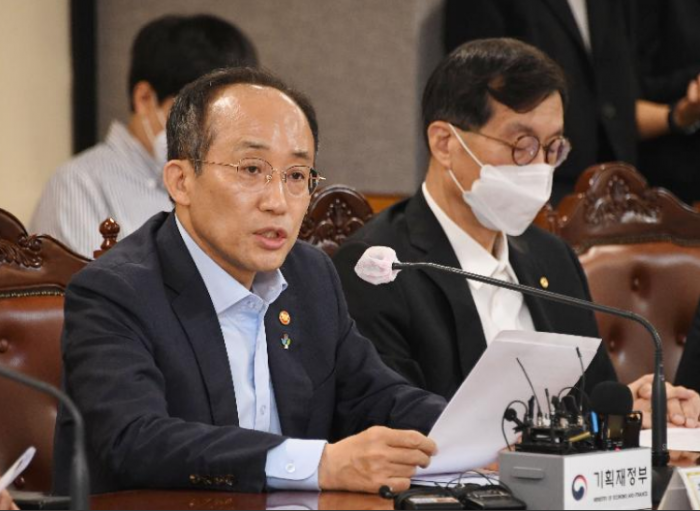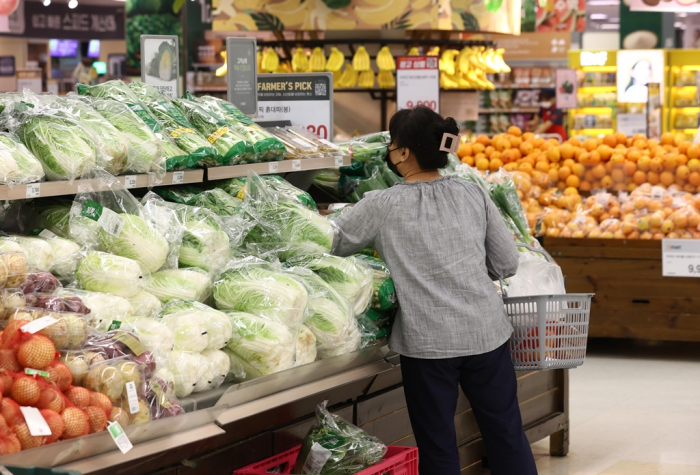Central bank
BOK may take big-step rate hike on Fed's aggressive tightening
JPMorgan expects S.Korea's central bank to increase interest rates by 50 bps in July; Goldman Sachs raises BOK rate forecast
By Jun 16, 2022 (Gmt+09:00)
3
Min read
Most Read
Samsung shifts to emergency mode with 6-day work week for executives


CJ CheilJedang to sell feed, livestock unit for $1.4 bn


Affinity to buy SK Rent-a-Car at $572 mn, more deals expected


Keppel REIT to sell Seoul-based prime office T Tower


Samsung Electronics' key M&A man returns; big deals in the offing



South KoreaŌĆÖs central bank may raise interest rates more than usual to rein in inflation in AsiaŌĆÖs fourth-largest economy after the US Federal Reserve on Wednesday announced its most aggressive tightening since 1994.
The Fed ramped up the target federal fund rate by 75 basis points (bps) to a range between 1.5% and 1.75%, while Chair Jerome Powell suggested further hikes including an increase of either half a percentage point or three-quarters of a point in July. That compared with the Bank of KoreaŌĆÖs current policy interest rate of 1.75%.
South Korean top policymakers including BOK Governor Rhee Chang-yong and Finance Minister Choo Kyung-ho met early on Thursday after the FedŌĆÖs decision, reiterating their pledge to do their best to curb inflation.
ŌĆ£Along with the monetary policy focusing on prices, we (the government and central bank) will strengthen our efforts to ease the cost burden on the supply side and prevent the spread of inflation expectations,ŌĆØ the finance ministry said in a statement after the meeting.
Inflation in South Korea has yet to show signs of stabilizing. Import prices surged 36.3% in May from a year earlier, matching a 13-year-high reported in October last year, according to BOK data.
The central bank last month delivered a back-to-back interest rate hike for the first time in 15 years to stem rampant consumer prices, indicating further tightening as it raised its inflation forecast to the highest level since the 2008-09 global financial crisis. Consumer prices in May rose 5.4% from a year earlier, the largest increase since August 2008.
GLOBAL INVESTMENT BANKS REVISE UP BOK RATE FORECASTS
Given sustained inflationary pressure and the FedŌĆÖs aggressive monetary policy tightening, the BOK will take a more hawkish stance, global investment banks predicted.
JPMorgan expected the BOK to raise the base interest rate by 50 bps next month, larger than its usual adjustment of 25 bps due to the inflation outlook and foreign central bank calls.
The investment bank revised up its forecast for the BOKŌĆÖs policy rate by the first quarter of 2023 to 3.25% from the previous 2.75%. JPMorganŌĆÖs revised inflation forecast for this year was 5.2%, the highest since 1998, while the BOK ramped up its prediction to 4.5% last month.
ŌĆ£In our baseline scenario, we expect the BOK to raise the policy rate by 50bp at the next meeting in July (vs. the 25bp hike or our previous forecast) followed by 25bp hikes in August, October and November to reach 3.0% by year-end; and a final 25bp hike in January 2023 should conclude the hike cycle at 3.25%,ŌĆØ the investment bank said in a note.

ŌĆ£There may be many changes because we still have three to four weeks until the next policy meeting,ŌĆØ Rhee said. The BOK is scheduled to hold an interest rate-setting meeting on July 13.
ŌĆ£The US policy rate is expected to rise to 3.4% by year-end and their rate hike is faster than us,ŌĆØ Rhee said. ŌĆ£We will comprehensively consider its impact on foreign exchange and bond markets rather than focusing only on the interest rate differentials.ŌĆØ
Goldman Sachs also raised its forecast for BOKŌĆÖs policy interest rate to 2.75% from the previous 2.5% and brought forward the peak timing to November this year from May 2023, citing accelerated Fed tightening, higher oil prices and a weaker won.
The BOK is predicted to raise the base rate by 25 bps at each of the remaining four policy meetings this year, the investment bank added.
Goldman expected every 5% depreciation of the South Korean won currency against the dollar to push up inflation by 0.3-0.4 percentage points. The won has lost almost 8% versus the greenback so far this year, becoming the worst-performing emerging Asian currency.
Its inflation forecast for 2022 stood at 4.8%, also higher than the BOKŌĆÖs forecast.
Write to Mi-Hyun Jo at mwise@hankyung.com
Jongwoo Cheon edited this article.
More to Read
-
 EconomyKorea May inflation tops 5% for first time since 2008-09 crisis
EconomyKorea May inflation tops 5% for first time since 2008-09 crisisJun 03, 2022 (Gmt+09:00)
3 Min read -
 Central bankBOK chief says big-step rate hikes possible; bond yields jump
Central bankBOK chief says big-step rate hikes possible; bond yields jumpMay 16, 2022 (Gmt+09:00)
3 Min read
Comment 0
LOG IN


